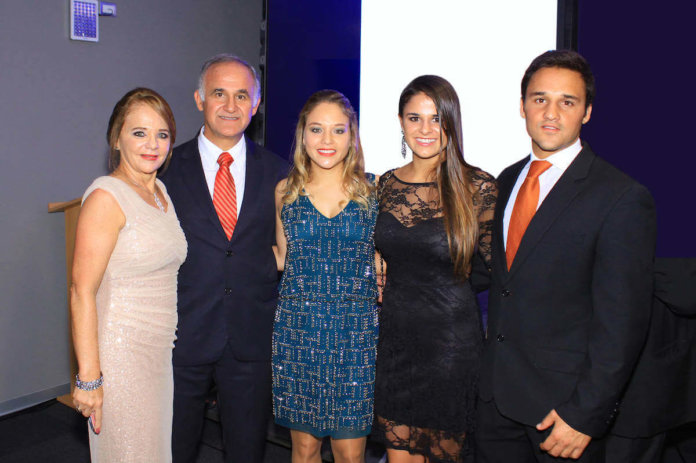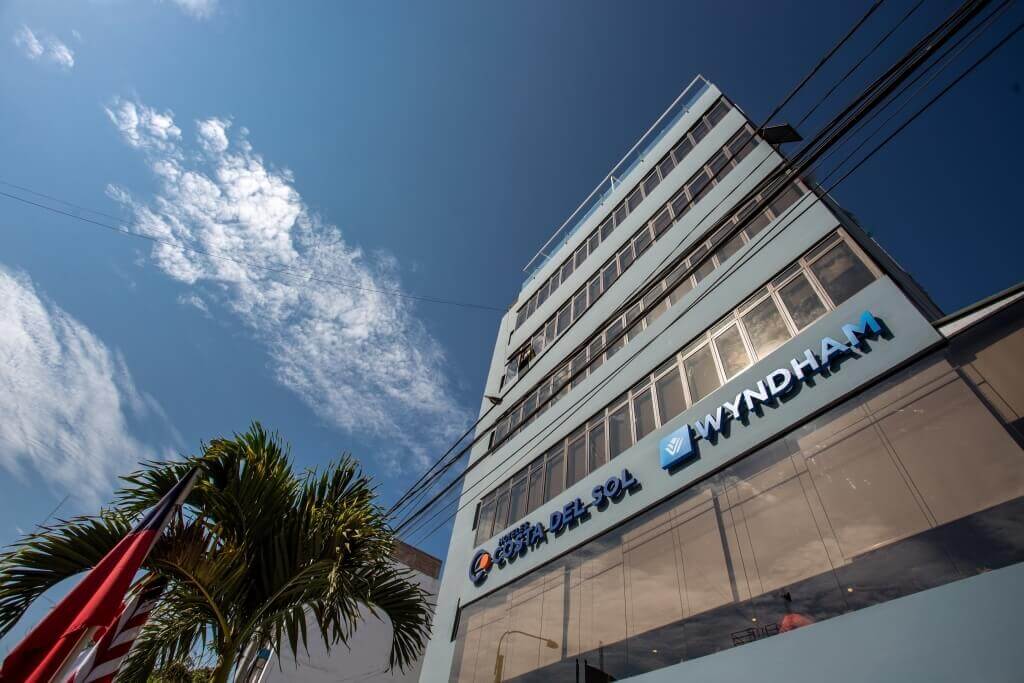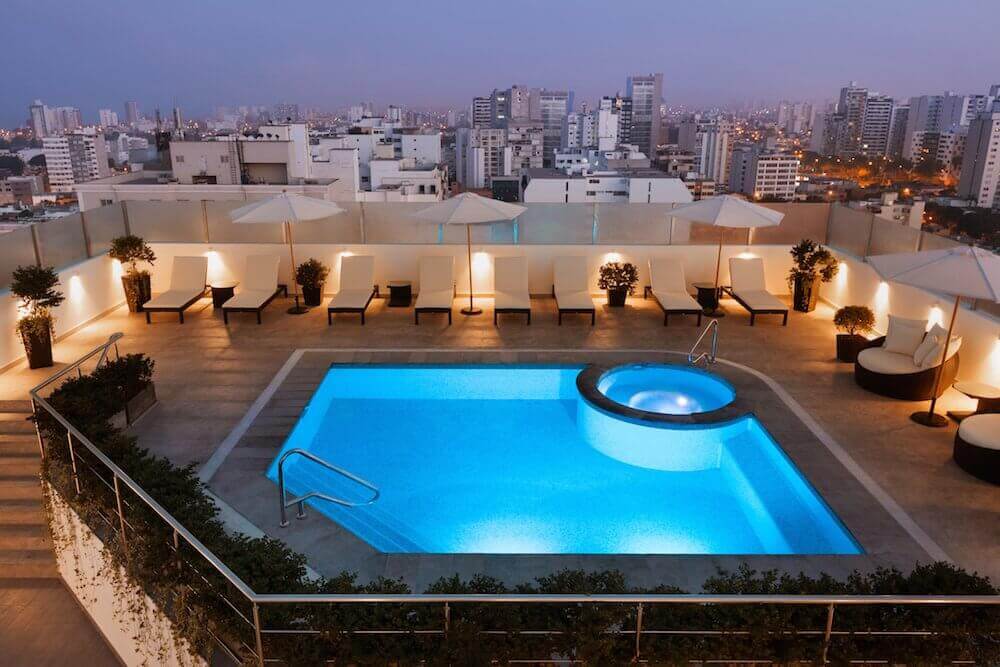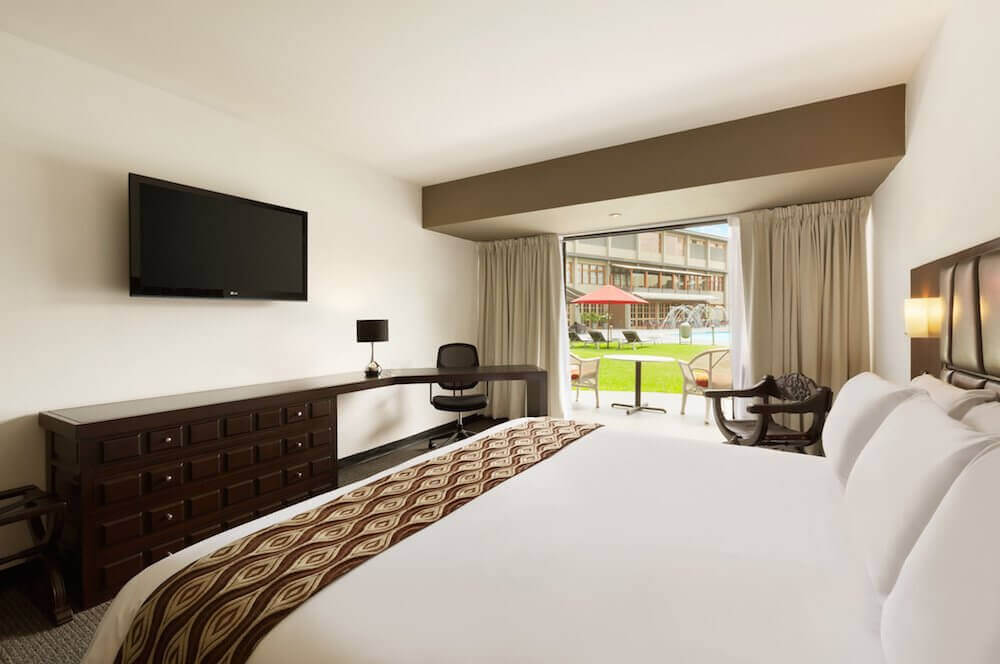
With ten locations across the country, the Mustafa family’s Costa del Sol group is a Peruvian hospitality heavyweight. Inspired by his hotelier father’s success, Mario Mustafa studied business administration in University concentrating specifically on how to grow a single hotel into a national phenomenon – something his own brand has excelled at.
Mario and his wife Mariella opened the first Costa del Sol hotel shortly after Mario graduated in 1995. The initial years were marked by economic hardship and political instability. Maintaining consistent growth through this period is a testament to the Mustafa’s agility as entrepreneurs and their determination to succeed together.
Since then, conditions in Peru have drastically improved. The family and the business have thrived. One daughter, Geilan, works in marketing and the other, Thais, is soon to take up a position with the chain as well. The Mustafa’s son, Mario Andres, has interned repeatedly with the business. Even though he’s now employed externally, a full-time position at Costa del Sol will always be a professional consideration.
In growing Costa del Sol, Mario and Mariella never lost sight of what they consider to be the highest ideal in hospitality, that is, making guests feel as comfortable as they do in their own house.
Costa del Sol initiated a rapid phase of expansion in 2014 when they partnered with Wyndham to build hotels in Tumbes, Piura, Chiclayo, Trujillo, Cajamarca and Lima. In doing so, the family business has become a household name. Still, the Mustafas work in close conjunction with their staff to ensure the continued success of Peru’s pre-eminent group of hotels.
Recently, Tharawat Magazine sat down with the Mustafa family to discuss family, hospitality, the idiosyncrasies of the Peruvian business climate and the process of phasing in the next-generation.
Perhaps we could start with some insight from the second generation. Geilan, what was it like watching the business from the outside and then becoming a part of it? Was it different than what you expected?
Geilan: It was. Previously, my only experience with the business was hearing it discussed at home. I knew about it, but I didn’t have an insider’s perspective. When I finally joined, I started to see things that you wouldn’t necessarily notice from the outside, and I learned more about the relationships between family and non-family members at the business. I would go out and eat with some of my co-workers, and I’d learn about their lives, and they would learn about us. This integration is crucial when it comes to building a healthy employer-employee relationship. It keeps us as owners in touch with their needs not just as workers but as people. I also think it helped that I started in an entry-level position, not as a manager. I had to make my way up the ladder, just like anyone else in the company.

Now for the parents – how did you feel when your daughter joined the business? Was this something you planned?
Mariella: No, it wasn’t actually – our children have always chosen their path. Before joining the business, she worked for a bank as well as two other companies. She went to the United States to obtain her master’s degree, and when she decided to come back, we were thrilled. It was important to us that she joined because she chose it willingly. It’s fantastic, we go out and get a cup of coffee every morning. I truly enjoy it.
Do you think you have higher expectations for your daughter than you have from other employees?
Mario: I do, but I think it’s because she knows more about the business than anybody else. As part of the family, she’s immersed in it around the clock.
Mariella: She knows how we think.
Mario: Yes, she certainly knows how I think. Also, she prepared for this opportunity when she went to university. That said, I think it was an enormous help that she learned what it was like to be an employee outside the family business. I think having this external experience is crucial.
Mario Andres, what was your entry into the family business like?
Mario Andres: I started in the hotel business as an intern. When I finished school, I went to work for different companies because, as my Dad said, outside work experience is a necessity. So, right now I’m doing my own thing, but I’m always involved with the hotel and the expansion that is happening all over Peru.
That’s an excellent segue way. How do you reconcile the dual roles of owners and executives? Have you started looking into governance structures?
Mariella: Yes, to some extent.
Mario: I think we’re always wearing both hats. For example, Geilan is in the marketing department but is also involved in the development and direction of the company – you can’t focus on one side of it only. As a family member, Geilan is always going to be concerned with all the aspects of the business. If she sees something worth mentioning, she’s going to tell us. Likewise, if we’re thinking of moving in a certain direction, she’s going to give her opinion. I don’t think its possible to separate the many aspects of the family business.
Mario Andres: As my Dad said, we may work in a specific role within the organisation, but we must be up to date with every side of the business. If I come to work here, I’ll continuously be looking around to see how we can improve.
What was the most significant challenge in trying to build the business?
Mario: I would say the most significant challenge was growing the business in a tough period for the country. When we started, we didn’t have a generous line of credit with the bank – our initial credit line was only for six months, and after six months, we had to find another creditor to pay the first creditor. Now, of course, they give us a 12-to-15-year window. It was incredibly difficult to think long-term knowing we had to repay in just six months.
How do you as a family business react to the growing trend that has emerged with Airbnb and other home-sharing platforms?
Mario: As I mentioned, the current economic climate in Peru enables us to think long-term. In the beginning, we were only considering one hotel at a time. Now, we have a long-term plan that takes us up to 2023. This plan covers specifics about what we’re going to do year by year as well as including a comprehensive, holistic growth strategy. Airbnb is definitely a competitor, but in some ways, it’s also good for us. It has helped to expand the tourism industry in Peru. I would like to see home-sharing platforms be more regulated in terms of taxation and safety standards, but overall, this competition is positive because it’s helping to promote the country.
Geilan: Our hotels have services that Airbnb can’t provide. For example, we offer a complimentary breakfast, a swimming pool and a gym. These are amenities that you won’t consistently find in apartments. Also, we cater to a different type of customer. Our clients are looking for an upscale experience. They want to be in a comfortable bedroom, and they want their room cleaned every day – Airbnb doesn’t necessarily offer that.

How much of a strategic advantage has family ownership been to you over the years?
Mario: I look at a hotel like it is a home – if you run it as a family, good things will happen. For example, here, we’re all very involved in the business, and we know our customers. As such, we can make them feel like they’re at home when they stay with us, and that’s an enormous advantage. Also, the fact that we’re a family business means a better relationship with our employees because we work closely with them every day. They are secure because they know the person behind the business. That’s the human part, and it helps that the business has a heart.
What advice would you give to other families when it comes to ensuring continued success into the next generation?
Mariella: As I mentioned earlier, I think it’s crucial that the next generation is allowed to come into the business of their own volition. You can’t push them. You have to make peace with the fact that not everyone wants to be in the same line of business that you chose.
Mario: Also, I think you have to teach by example. It’s not just how you act within the family but with the customers and suppliers as well. You set the standard in terms of operations. From your example, the next generation knows what is expected of them, and they can decide whether or not they want to take part in the business. I also think you have to work in various positions within the company – you have to experience the business as a worker before you know it as an owner. This is especially important in an industry like ours where we need to hire lots of people beyond the scope of the family. The next-generation has to love the family business because if they don’t want to go to work, it’s better not to go. Cultivating healthy family and business environments is crucial.

Mario Andres and Geilen, what do you recommend to other next-gens who are deciding whether or not they want to be a part of the family business?
Mario Andres: I agree with my parents’ perspective, if they don’t want to be in the business, it doesn’t do any good to force them. Maybe they’ll want to join later. The door should be open, but if it’s not their time, it’s better to wait until it is, and maybe it never will be.
Geilan: I would say that they have to try it before they decide to go and do other things. It’s an excellent opportunity to learn the business from your parents because there’s no guarantee they will still be there when you do finally want to join.
As you look to the future, what’s your greatest wish for the company? Where would you like to see it in say five years?
Mario Andres: I would like people to say, ‘They’re a good family, they’re good people.’ Not just, ‘They’re good at business.’
Geilan: I’d like to see the hotel continue to be like my father says, a home to its patrons. I want people to keep thinking, ‘When I go to any city in Peru, I’ll go to Costa del Sol because that’s home.’
Mariella: I would like to slow down and give my husband more rest. We’re starting to do this because we now have a granddaughter.
Mario: I’d like to see the business stay in the family for a long time – to become a 100-year company. If you set the company on a professional course, and the children are professionals, I think it’s straightforward for them to continue. It’s incredible to have so many people working for the company. Right now, there are around 9000 employees, and I consider them to be part of the extended family. Places all over Peru where we’ve built hotels have recognised Costa del Sol for regenerating the local economy and improving conditions in the town. It’s a good company that people can be proud of, and I think this reputation is one of our greatest accomplishments.









